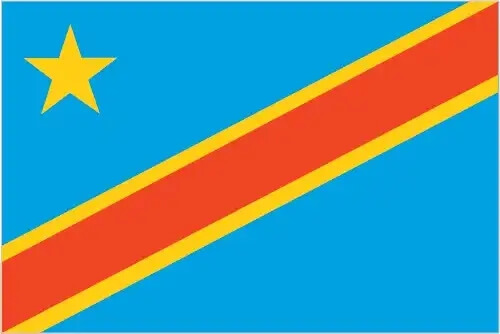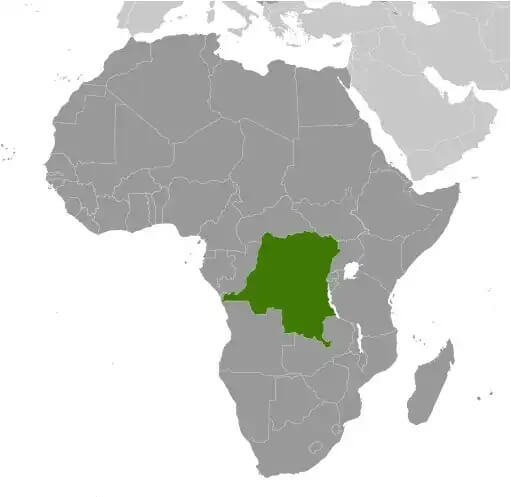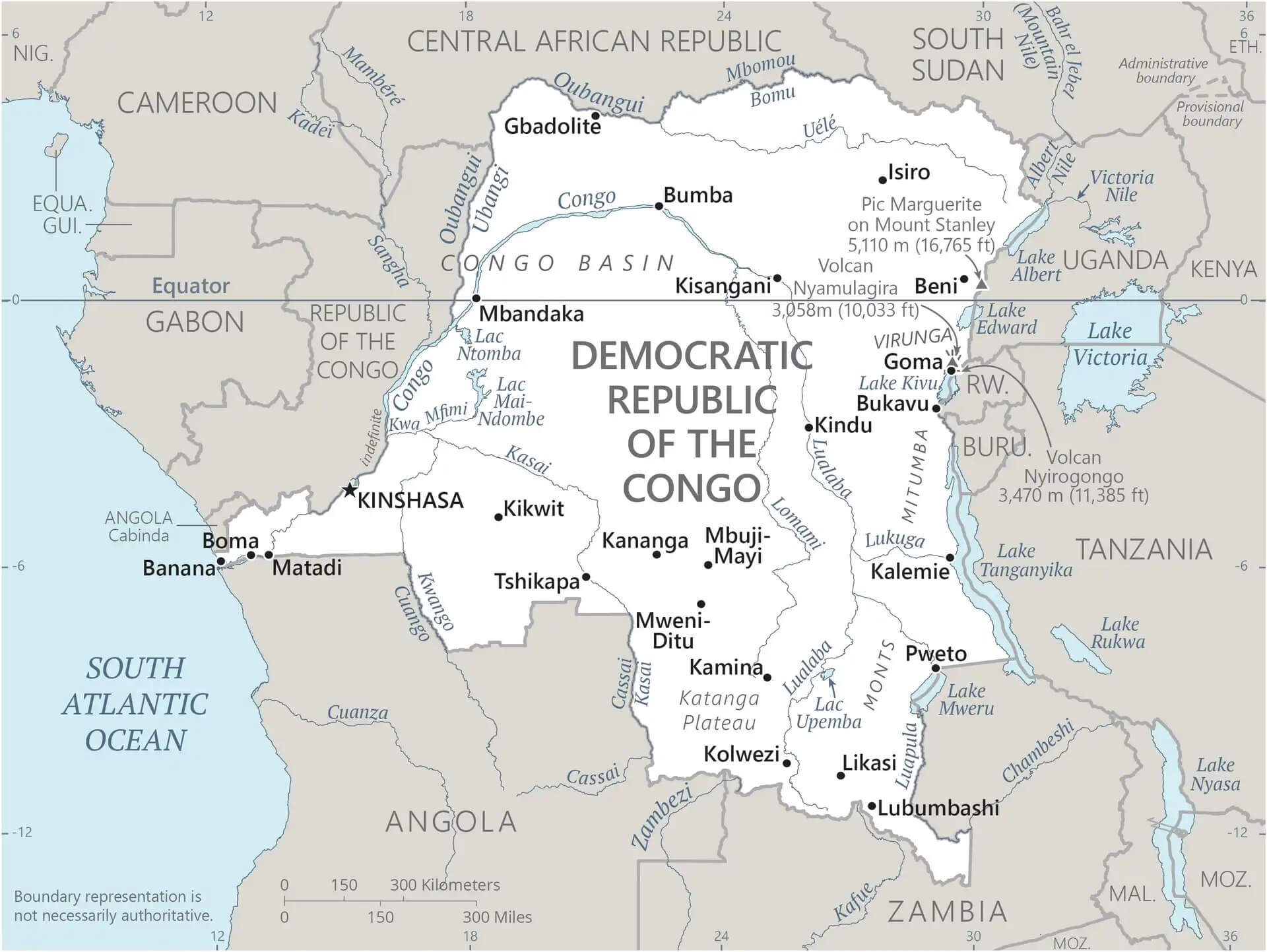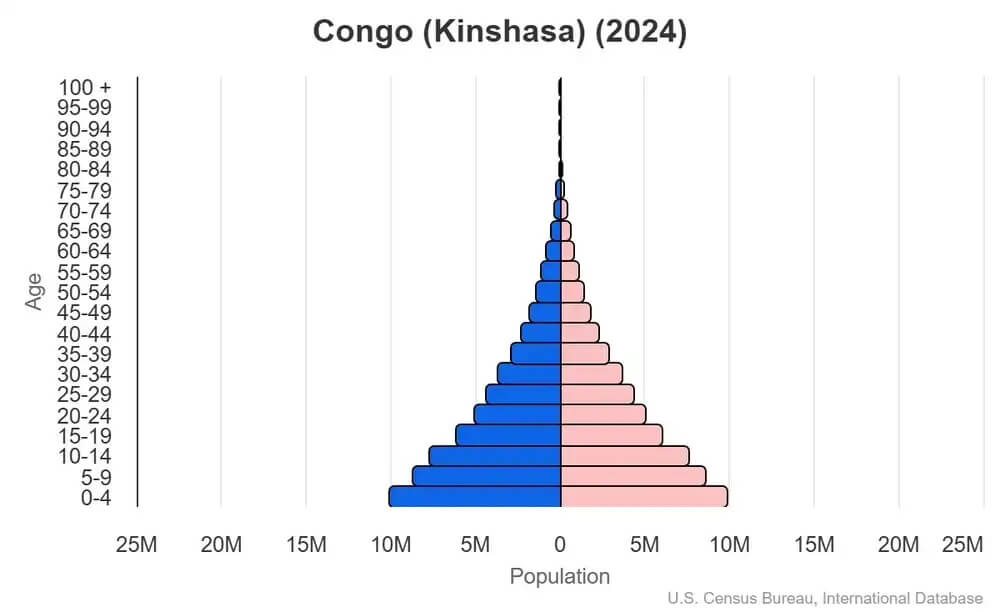World Book
Democratic Republic of the Congo
World Book Index
52


With a score of 52, the country is ranked 122nd out of 158 countries in the World Book ranking. (more information)
Introduction
After several centuries of local governance, the Kingdoms of Kongo, Luba, and Lunda emerged and ruled different parts of the Congo River Basin until the end of the 19th Century. European conquest in the 1870s brought the territory under the control of Belgian King LEOPOLD II and later the Belgian state. The Republic of the Congo gained its independence from Belgium in 1960. The country’s name was changed to Zaire in 1971 and to Democratic Republic of the Congo in 1997.
Neighboring countries
Angola - Burundi - Central African Republic - Republic of the Congo - Rwanda - South Sudan - Tanzania - Uganda - Zambia
Geography
Area
total: 2,344,858 sq km
land: 2,267,048 sq km
water: 77,810 sq km
Climate
tropical; hot and humid in equatorial river basin; cooler and drier in southern highlands; cooler and wetter in eastern highlands; north of Equator - wet season (April to October), dry season (December to February); south of Equator - wet season (November to March), dry season (April to October)
Natural resources
cobalt, copper, niobium, tantalum, petroleum, industrial and gem diamonds, gold, silver, zinc, manganese, tin, uranium, coal, hydropower, timber
People and Society
Population
total: 115,403,027 (2024 est.)
Ethnic groups
more than 200 African ethnic groups of which the majority are Bantu; the four largest groups - Mongo, Luba, Kongo (all Bantu), and the Mangbetu-Azande (Hamitic) - make up about 45% of the population
Languages
French (official), Lingala (a trade language), Kingwana (a dialect of Kiswahili or Swahili), Kikongo, Tshiluba
Religions
Christian 93/1% (Roman Catholic 29.9%, Protestant 26.7%, other Christian 36.5%), Kimbanguist 2.8%, Muslim 1.3%, other (includes syncretic sects and indigenous beliefs) 1.2%, none 1.3%, unspecified 0.2% (2014 est.)
Population growth rate
3.11% (2024 est.)
Government
Government type
semi-presidential republic
Capital
name: Kinshasa
Executive branch
chief of state: President Felix TSHISEKEDI (since 20 January 2024)
head of government: Prime Minister Judith SUMINWA Tuluka (since 29 May 2024)
Diplomatic representation in the US
chief of mission: Ambassador (vacant); Chargé d'Affaires Michael SHAKU YUMI (since 1 August 2024)
Diplomatic representation from the US
chief of mission: Ambassador Lucy TAMLYN (since 6 February 2023)
Economy
Economic overview
very poor, large, natural resource-rich sub-Saharan country; possesses the world’s second largest rainforest; increasing Chinese extractive sector trade; massive decrease in government investments; increasing current account deficit and public debts
Real GDP (purchasing power parity)
$164.367 billion (2024 est.)
$154.081 billion (2023 est.)
$141.867 billion (2022 est.)
Real GDP per capita
$1,500 (2024 est.)
$1,500 (2023 est.)
$1,400 (2022 est.)
Exports
$29.65 billion (2023 est.)
$28.753 billion (2022 est.)
$22.354 billion (2021 est.)
Exports - partners
China 69%, UAE 7%, India 3%, Spain 3%, Egypt 3% (2023)
Exports - commodities
refined copper, cobalt, copper ore, raw copper, crude petroleum (2023)
Imports
$33.68 billion (2023 est.)
$31.699 billion (2022 est.)
$22.193 billion (2021 est.)
Imports - partners
China 35%, Zambia 12%, South Africa 12%, India 5%, Belgium 4% (2023)
Imports - commodities
trucks, refined petroleum, stone processing machines, plastic products, sulphur (2023)
Human Development Index
The country's Human Development Index (HDI) is 0.522, ranking it 171st out of 193 countries tested. (more information)
World Happiness Report
The World Happiness Report ranked the country 92nd out of 158 countries tested with a score of 5.304. (more information)



